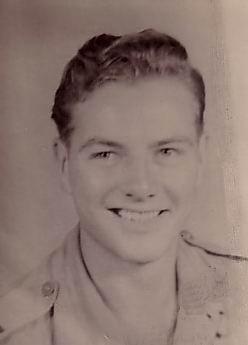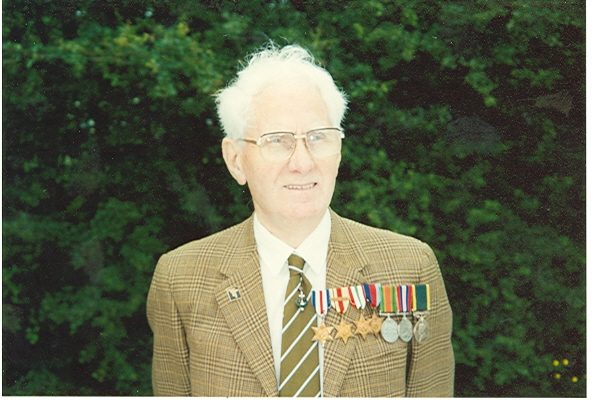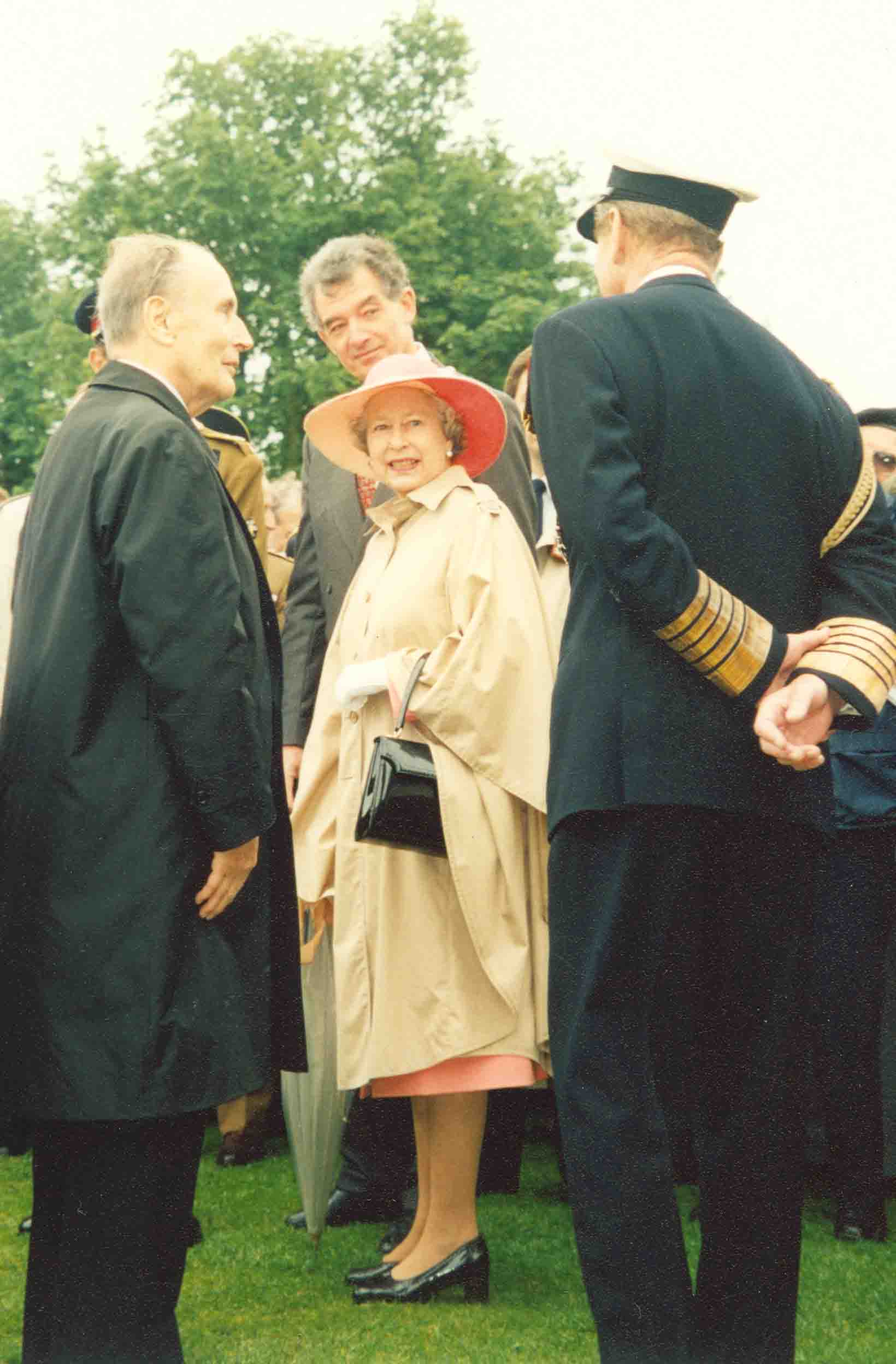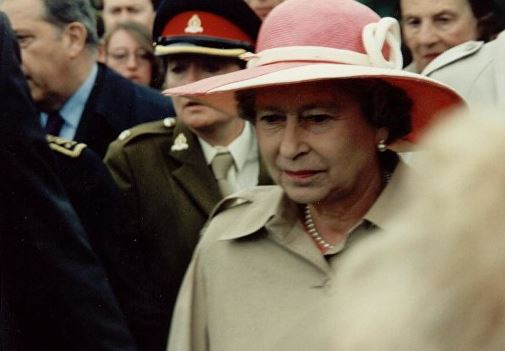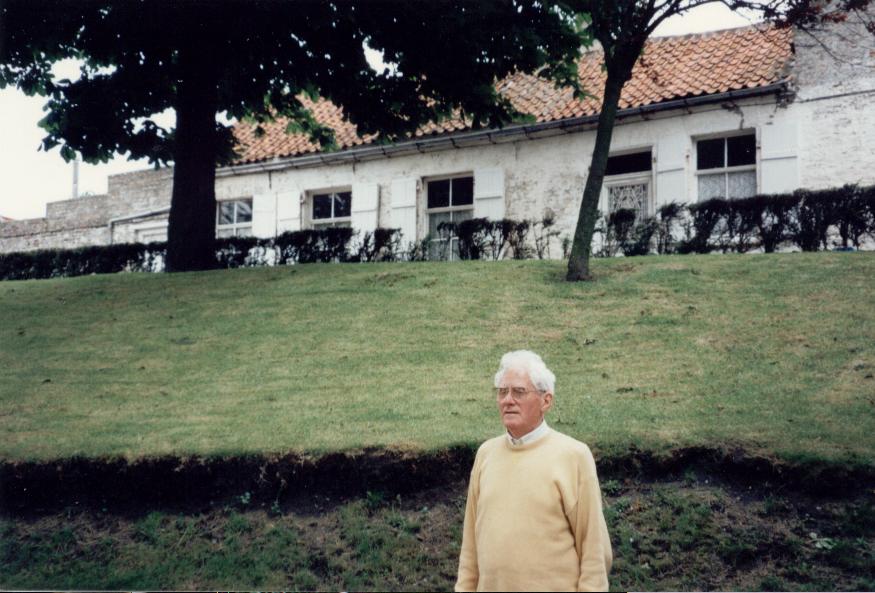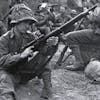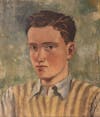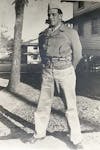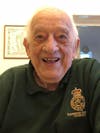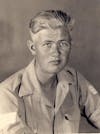27 D-Day Veterans remember - Bennett and Cheall, WWII
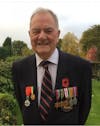
Two veterans remember two beaches - Juno and Gold WW2
92 year-old Royal Marine Roy Bennett remembers his WWII Juno beach landing and more:
"There was a horrendous noise as we landed, people were dying leaving the landing craft ..."
Bill Cheall re-visits France and Gold beach on the 50th anniversary of D-Day in 1994.
"We arrived 50 years later at 12.15 hrs and it was still drizzling with rain, and windy, just like it was on D-Day, WW2".
More great unpublished history - of the Second World War.
Link to feedback/reviews Thank you.
Below: WWII 48 Royal Marine Commando Roy Bennett.
92 year-old Roy remembers his WWII Juno beach landing and more:
"There was a horrendous noise as we landed, people were dying leaving the landing craft ..."

Below: WWII veteran Bill Cheall and son at Bayeux at the end of a wonderful holiday 1994

Bill Cheall re-visits France and Gold beach on the 50th anniversary of D-Day in 1994
"We arrived 50 years later at 12.15 hrs and it was still drizzling with rain, and windy, just like it was on D-Day"
Best podcast for World War 2 history and the second world war
Interested in Bill Cheall's book? Link here for more information.
Fighting Through from Dunkirk to Hamburg, hardback, paperback and Kindle etc.
HM Queen Elizabeth II signs the visitors book flanked by President Mitterand and Prince Phillip, the Duke of Edinburgh. Copyright Paul Cheall
The Queen mixes in the crowds. I was that close to her I could have touched her but she had a bodyguard nearby! Not a great quality image because I didn't have time to focus, but it's the story behind the photo which makes it one of my favourites, that is the representation of the UK democracy, what Dad fought for.
FT Episode 27 – Veterans Bennett and Cheall remember D-Day, WWII
Roy Bennett re-lives his Juno beach landing and more
Bill Cheall re-visits France on the 50th anniversary of D-Day, WWII
RM Commando Roy Bennett – Juno Beach veteran, WWII
"I was seventeen when D Day started and my unit landed early in the morning on Juno beach, Normandy.
There was a horrendous noise as we landed, people were dying leaving the landing craft boat, it was terrible, bullets were crashing all around at our feet and parachutes were falling from the sky.
Bill Cheall – Gold Beach veteran, WW2
"We arrived 50 years later at 12.15 hrs and it was still drizzling with rain, and windy, just like it was on D-Day.
The French were greeting us with genuine friendliness and there were posters everywhere saying ‘We welcome our liberators’
Hello
This episode is going to revolve around a note my Dad wrote about the 50th anniversary of WW2 D-Day celebrations in France in 1994 – so it’s an old soldier’s
memories of a very emotional few days where he revisits old ground that he’d visited 50 years ago. And reading it certainly brought a few tears to my eyes I can tell you.
But first I’ve got a surprise extra – in some ways the main event – because hot off the press some kind person has just sent me a first-hand memoir of Juno Beach would you believe?
So this is going to be not only of interest to Brits but also to Canadians, both of whom landed on Juno beach. You know it’s funny how much I’ve learnt doing Dad’s memoirs, cos years ago I’d never heard of Juno or Gold for that matter – yet here I am trotting them off the tip of my tongue like I was, well, my Dad!
Jonathan emailed me just a couple of weeks ago:
“Can I firstly say how much I’ve enjoyed your podcasts, I’ve listened to all of them at least once and I’ve even bought the book!
I wonder if the attached brief memories of an RM48 Commando might be of use for a podcast? Roy Bennett is my friend’s father, and is still alive and well at the ripe old age of 92. He’s a D-Day veteran and went through the war largely unscathed except for the emotional scars that I’m sure every man who served must have felt.
As such Roy has never really spoken much about his time in the army. Just recently however he has put pen to paper and I attach his memories of his time during the war years. Roy is an excellent writer despite his advancing years, after the year he became a copy writer which I think is evident in the way he writes. These notes have never been published and I think they make for an entertaining read.
I am trying to get him to write more but he isn’t keen to write graphic accounts of his time during the war, he simply says these things are better left in the past and too painful to put in writing. Best regards, Jonathan Hill
Jonathan I can’t tell you how chuffed I was to get your email and I think Roy’s memoir is terrific and makes the perfect accompaniment to Dad’s record of his visit to France 50 years after it all happened. Jonathan many thanks for buying Dad’s book. If you let me have me your address I’ll send you a photo souvenir or two to use as a bookmark in Dad’s book and that goes to anyone else who would like the same. Just drop me a line, either through Twitter or Facebook or Email – all the links are on www.fightingthroughpodcast.co.uk,
In a recent show I mentioned Rufty Hill being a drummer in a band and I speculated that his mate Bill Vickers might have been on the trumpet? Well after the show I was studying one of the photos and realised Bill Vickers was also wearing a leather drum apron on his thigh so they must both have been drummers in the band – how good is that? It’s made me think about how good drumming music can lift the spirits.
On D-Day, some Marines became landing craft crew and saw extensive action. And they get mentioned by Brian Moss in his D-Day memoir Episode 2. Take a listen if you’ve not heard it and learn how Marine Cpl. George Tandy was awarded the Distinguished Service Medal for his actions on D-Day – just great stuff – and Brian Moss’s memoir is terrific – the most amazing action! And his son Mike Moss just wrote to me recently with some great news on his own research so I’ve decided I’m going to slot it in for the PS – so don’t switch off till you hear the music.
There is plenty of material about the Royal Marine Commandos on the web and I’ve put some links in the show notes for anyone who wants to explore further, including to the Commando Veterans Association forum, which has a great display of photos for you to enjoy. Meanwhile …
The memories of 48 RM Commando Roy Bennett.
“The Humour and Heartbreak of War”
When I was 16 I was working in a Birmingham factory that made equipment for the war. One morning, when I arrived at work, I noticed a new office had opened next door. When I looked through the window I found they were recruiting and that afternoon I went in and saw the sergeant.
He didn’t ask my age, he just asked which forces I wanted to join – I replied the Royal Marines. When he asked why, I replied “because they are the best sir!!” He seemed surprised but said I would have a letter in 10 days. He was right, the letter arrived to tell me that I had to appear at the Royal Marines head office in Portsmouth for a medical. I passed the medical and was very happy that they wanted me.
I hadn’t told anybody in my family that I’d signed up and when they heard the news they were very shocked that at 16 I was in the marines. My Grandmother was particularly upset.
I went off to Portsmouth and after initial training at Eastney Barracks we moved on to Fort Gomer in Gosport. There were a number of forts built during the Napoleonic War to house French prisoners.
Some were at sea; this was on dry land. It had walls eight inches thick and smelt musty. It was reopened during the Second World War to house Italian prisoners taken in the desert, but was condemned by the Red Cross. So they put Marines in! We finished our basic training there.
One day three of us were detailed to report to the Cook Sergeant, “I want you lot to go to the orderly room and pick up a cheese. It’s for the officers’ mess, but I want you to bring it here. Be careful because it’s very heavy. Do you understand?” Looking very subdued we replied “yes, Sergeant.”
When we arrived at the orderly room we found that the cheese was round, huge and covered in hessian. It took three of us to control it as we set off to roll it to the galley. All around the ground was rough and the path to the galley was narrow.
When we got the narrow part which was about ten feet above a brook that meandered through the area we had a problem. As young lads we were laughing and joking about things in general when the huge cheese threw a wobbler on the uneven ground.
It started to go from side to side and we were unable to control it, horror of horrors it went over the edge end tumbled down into the brook below where it lay on its side in the water. Looking back today it sounds hilarious, but we recruits were frightened to death to tell the Cook Sergeant.
We managed to get it out of the water and in the break period we got some of the squad to help us get it back on the path where we tried to dry it off with loads of towels. In the meantime the cook came looking for his cheese and was not a bit interested in our story.
But the next morning we found ourselves outside the orderly room again, where we were all given three days CB (Confined to Barracks) by the Adjutant for carelessness in charge of war office property!
After our next leave we were moved to the Royal Marine depot at Deal in Kent for the next phase, which was tactical training. One day a shell, from one of the big guns near Calais, landed on the parade ground just as a marine was walking across. He had to have a leg amputated and that really brought it home to us all how close the Germans had really got to our country.
At Deal there was a sadistic Drill Instructor who loved to humiliate the recruits. One was a 17 year old volunteer from Devon who had the misfortune to have the name W.C. Brown. He was given a dreadful time at the hands of the Sergeant and we all felt sorry for him.
In the squad was a huge man, much older than we youngsters. There was an assortment of physiques in all squads but he really stood out, of course his nickname was ‘Tiny’ and the Sergeant loved to take the micky out of him. One day as the squad were drilling on the parade ground the Sergeant gave the order to “fix bayonets” and at the end of the parade ground he gave the order “about turn”.
As they marched back towards the Sergeant, Tiny broke ranks and charged as if he were doing bayonet practice. Just in time the Sergeant ran for his life. We all felt at the time that Tiny had done the right thing and it gave us something to talk about for days.
Tiny spent some time in the glass house and we never saw him again. The Sergeant was posted immediately, but I was to meet him once more at the end of the war in the Pacific area by which time he was a regimental Sergeant-Major.
While we were at Deal we spent the last few weeks at Kingsdown a few miles away to complete our field training. We had to take turns to guard duty. Just outside the camp there was a wood overlooking the sea and there were a number of buoys [with lights] on at sea. One of our orders was to keep an eye on them and report immediately if any of the green lights turned red, I was colour-blind anyway but nobody took any notice when I told them.
There were quite a number in the squad who came from towns and knew little of country life. Being on their own in a wood with lots of rustling and owls hooting made them uneasy, and more than a little nervous. Those of us who were country lads had quite a good laugh at their expense.
At Kingsdown we were in one of the Warners holiday camps with two of us to a chalet. Above the bed was a shelf and on this we had to put our fighting order pack which had to be perfect with the exact amount of ground sheet showing.
On top of it was our steel helmet. One evening a duel started when the huge siege guns on both sides of the Channel opened up. The chalet shook and the steel helmet came crashing down almost decapitating me!
I finished the training and joined a new unit – Royal Marines 48th Commando. As I was the youngest all the lads nicknamed me ‘Babs’, which I hated.
I was seventeen when D Day started and my unit landed early in the morning on Juno beach, Normandy.
There was a horrendous noise as we landed, people were dying leaving the landing craft boat, it was terrible. Bullets were crashing all around at our feet and parachutes were falling from the sky.
I was very frightened and just stopped in my tracks, I couldn’t move. Suddenly I shook myself and said “I am a Royal Marine” and got moving as quickly as I could up that beach. It was the worst thing that has happened to me in my whole life. I was very fortunate and got away; I was never injured as so many were.
When we were in Normandy one of my best friends was a lad from Manchester, he was great company and never had a care in the world. He had a lovely girlfriend and thought the world of her, she wrote to him several times a week. Mail was not the number one priority at the time and would often be delayed, and then several letters would arrive at once. They were precious and we would retire to our own secluded spot to read them in privacy.
My mate always looked forward to receiving his letters from home but suddenly there were longer periods when he received nothing and he became a different person, even with me, his friend. Then one day the post arrived and he got a letter, he was really excited. When he didn’t return from his ‘private spot’ I went looking for him and found him with his head in his hands and the letter on the grass.
He was totally devastated, I lit a cigarette and gave it to him. “What’s happened?” I asked, expecting that I already knew the answer. “She’s gone Babs” he replied, not looking at me “She’s met someone at work”. I did not know what to say to help him, but watched helplessly as he became a shadow of himself and lost interest in everything.
“You’ve got to be careful” I warned him “If you lose your concentration it could be fatal for you”. “Who cares?” he replied. “Well, your family does for a start, and I do as one of your best mates. You’re eighteen for God’s sake with your whole life in front of you”. I was upset and worried for him but he was in no mood to listen. One day he went out on patrol with his partner and never returned - his mind was elsewhere and he paid the price.
One further memory I do have – a bugler arrived on the battlefield with a Sergeant holding a bucket of rum, the Sergeant gave everyone a tot apart from me, “You’re too young for this stuff Babs” he said. I was very upset that the Royal Marines let me fight the enemy but they would not give me a drink!!
Later I went to Australia and that was wonderful, we went to join the attack on Japan but on the way we were told that the war was over and that was such good news.
When I got home they asked me to stay on and train new recruits but I’d had enough of it all by then so I left. But I’m proud to have been a Royal Marine and part of D Day. After all this time and at the age of nearly 92 the French have presented me with their highest order The Legion d’Honneur for my part in the Normandy landings on the 6th June 1944.
I must say thanks to you Jonathan Hill for sending this memoir in and Roy – thank you so much for making the effort to write those memories down – they are absolutely priceless and I hope people will be listening to this podcast for many years to come, so you’ll go down in history my friend.
I think it’s fantastic that the French people awarded you with the Legion d’Honneur – what an honour. No doubt you’ve thought of all your fallen pals over the years and I suspect, in your mind, and in no small measure, you’ve awarded it posthumously to all your fallen comrades.
I’m going to move on now with a very funny story which Roy’s memoir reminded me of. It’s the bit about the interview in the recruiting office where he puts his case to be a marine. I have a friend Wayne who tells a story about when he interviewed to join the Royal Navy in the 1970’s
Dad’s WWII diary of 1994 – (Transcript available on request)
In more recent years I’ve made a short video tracing the path and actions off WW2 Gold beach. See show notes.
WW2/WWII podcast contd
One great thing about doing this show has been the intricate details I’ve been able to add to Dad’s account of events. Names, places, events and even photographs. And, above all, these fantastic memoirs that we can all read and listen to, might never ever have seen the light of day if not for the chain of events that Dad set in motion when he first put pen to paper to write his memoirs. And for that dad, I thank you so much old chum. I’ll love you forever.
Next episode
I’m sorry to say it’s going to be a short one next time or so – call it a PodSnack rather than a podcast!
But as soon as I can I’ll be back delivering full length shows for you.
In the meantime, keep a look out for my podsnacks!
You’ve been listening to the Fighting Through podcast episode 27, Veterans Cheall and Bennett remember D-Day
PS:
This is coming from Mike Moss who just wrote to me with some fascinating news on his own research – stuff to do with re-treading his father Sgt Brian Moss’s escapades in 233 Field Company, Royal Engineers who were working very close to Dad’s Green Howards and particularly the 5 East Yorks. If you’ve not heard the episodes depicting Brian’s memoirs on the London Blitz, North Africa and D-Day then you are missing a treat. So if you’re enjoying the show I do commend you to catch up on those episodes. It doesn’t get much better than that! I’ll put some links in the show notes at www.FightingThroughPodcast.co.uk
Anyway, this is what Mike, now living in Canada, said:
“Dad had a phenomenal memory and while much of his 'diary' was written from memory in the mid-eighties, he also made dozens of sketches at that time to illustrate various scenarios. Two decades later, after his death, I used many of those sketches like treasure maps as I went on several quests to follow his footsteps, first to sites in London where he had started with the RE in an unexploded bomb-disposal company (familiar sites, but by then I had already been living in Canada for 25 years).
In later trips I travelled through Sicily, and on another I went from Gold beach in Normandy through Belgium and into Holland (following their route in Operation Market Garden) as far as Nijmegen, where a butterfly bomb finally took him out of the war in Sept. '44.
Some of the sketches were in rather poor condition so I digitised them and have been restoring them, replacing text and adding colour. I intend to use these to illustrate a book based on his diary. It's been a very long project, interrupted by several other writing projects including a feature film which consumed quite a lot of 'free' time over a 7 years gestation.
During my travels I visited Commonwealth War Graves sites where Dad's former comrades were buried and photographed their headstones. Incredibly, along the way, I found two men still living, who remembered Dad (one in Sicily, in a village where Dad had taken their surrender, in a sort of comic opera after the horrors of Primosole Bridge); the second was on the Dutch border where Dad's platoon had stopped overnight in a hamlet.
The homeowner remembered how he had given Dad some eggs in exchange for cigarettes. He took me in and showed me where Dad had slept that night, the only night in the war where he had accepted such an offer of a real bed from a civilian. Fifteen years ago, or thereabouts, I traced Spencer Crookenden, who was then still alive, and spoke to him on the phone. He denied having been known as Kickingstraps but I'm convinced the nickname was correct. It certainly sounds right!
I managed to find the precise location where Dad and his men sought and destroyed three Sturmgeschutz tanks ('Stugs'), parked line astern on a track near a railway line. Before even going to Sicily I had studied the area on Google earth and identified the likely spot. Sure enough - it was just as he had described. Sixty-plus years later, a signal box still lay in ruins from the exploding Stugs. A lava rock wall at the side of the track is blown away in 3 places, consistent with where each of the Stugs was parked.
After my return from Sicily, I actually managed to trace one of the tank commanders, still alive in Bonn and I came to understand how these assault guns had been abandoned. The only chapters of the diary I have not pursued in these quests is North Africa. I was warned that some of the areas I might want to visit were still mined. This was in the days before Libya and its neighbours became a newly dangerous place again, so I doubt I will ever make those trips, now.
I have photocopies of the 233 war diary and I can tell you that, other than describing where they were on a particular day, and what significant actions had been joined, I was a bit disappointed by the lack of detail. NCOs are not usually named, even when they were killed. The butterfly bomb event that seriously wounded Dad only named him as 'an NCO' and his colleague who was killed was referred to as 'one Other Rank killed'.
Only the officer, a Lt St John, was named. For all those subsequent decades, Dad thought the officer had been killed. But the War Diary states he was wounded and I could find no record of him as being listed as a fatality either in Holland or the UK.
After being taken to a casualty clearing station Dad was airlifted days later to a hospital in Wiltshire. By happenstance, a nearby village would become home for our family, 15 years later.
My biggest regret is that I didn't start the trips until after Dad's passing. Somehow, visiting those once dangerous places helped me understand what had shaped him to become the man I knew and loved.
Listener, I’ve been privileged to read Brian Moss diary and it is terrific. I still listen to the shows I did on his memoirs and never tire of listening to them - even the drone of my own voice - so I do hope one day Mike’s ambition to get it published will be realised. If it is, you’ll certainly be hearing about it on the show.
I’ve just heard from another listener Iain Karim whose grandfather was also in 233 Field Company, Royal Engineers and he’s still doing research so at some point I’ll be including something from him in the show. Needless to say I’ve put him in touch with Mike Moss.
I’ve had quite a few listener feedbacks recently and I will be covering more of them in future episodes – promise.
Bye bye now
This was a ww2 and wwii podcast
Home Page: www.fightingthroughpodcast.co.uk
Featured Episodes
If you're going to binge, best start at No 1, Dunkirk, the most popular episode of all. Welcome! Paul.
PS. Just swipe left to browse if you're on mobile.










